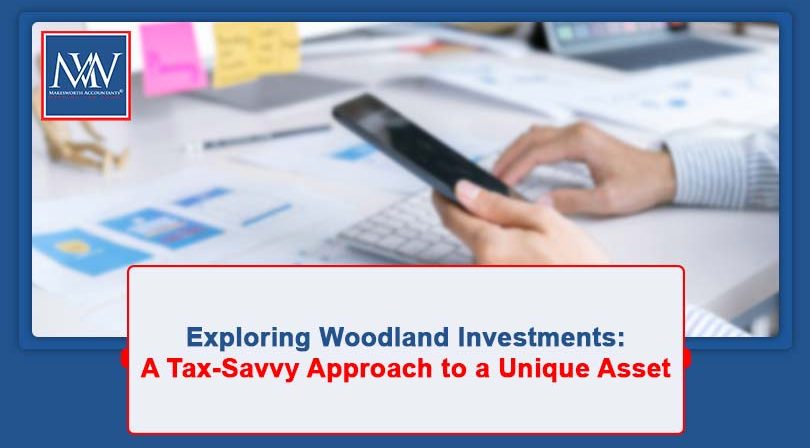
Exploring Woodland Investments: A Tax-Savvy Approach to a Unique Asset
Why Invest in Woodlands?
Take a drive through the countryside, and you may notice signs declaring ‘Woodlands for Sale.’ These aren’t just scenic plots of land—they can be a strategic investment with noteworthy tax advantages. Investing in commercial woodlands can open the door to several reliefs and exemptions, especially when managed with profit in mind.
Tax on Timber Profits: The Exemption Advantage
One of the biggest benefits of owning commercial woodland is that profits from timber sales, whether the timber is standing or felled, are exempt from income tax and corporation tax. However, this exemption only applies if the woodland is operated commercially, with a genuine intention to make a profit.
The flip side? While you don’t pay tax on profits, you also can’t claim relief for any costs or losses from managing the woodland. Additionally, many woodland owners use their land for other short-term purposes, such as grazing. These alternative income streams are not covered by the exemption and are taxed under standard rules.
VAT Still Applies
Despite the income tax and corporation tax relief, there is no special exemption for VAT. If your taxable turnover exceeds £90,000 in 12 months—or is expected to do so in the next 30 days—you must register for VAT. This is an important detail for anyone looking to generate commercial income from woodland assets.
Capital Gains Tax: Separating Trees from Land
Woodland value often increases as trees mature, especially as they near harvest. When selling woodland, the value attributable to the timber is exempt from capital gains tax (CGT). However, the land value itself is still taxable. To calculate CGT correctly, it’s important to split both the sales proceeds and acquisition costs between the timber and the land.
Deferring Gains with CGT Roll-Over Relief
If you sell a commercial woodland and reinvest in another business asset, you may be eligible for CGT rollover relief. This allows you to defer the gain by offsetting it against the cost of the new asset. While the gain is deferred at the time of purchase, it will be realised upon the future sale of the new asset, as the original gain reduces its base cost.
The replacement asset doesn’t have to be another woodland but must be used in a qualifying trade.
Inheritance Tax Planning Opportunities
Commercial woodlands can also be advantageous from an inheritance tax (IHT) perspective. If the land has been owned for at least two years before the date of death, Business Property Relief (BPR) may apply to both the timber and the land.
In non-commercial cases, Agricultural Property Relief (APR) might be available, particularly if the woodland is ancillary to working agricultural land.
There is also a little-known relief specifically for woodlands, which only applies on death (not for lifetime transfers). This relief defers the IHT due on the value of the timber until it is sold or gifted. To qualify:
-
Purchased woodland must be owned for at least five years.
-
Woodland received via inheritance or gift has no minimum ownership requirement.
If the recipient dies still owning the same timber, the deferred IHT charge is cancelled.
The Definition of ‘Commercial’: A Cautionary Tale
The courts interpret ‘commercial basis’ strictly. For instance, in the case of Jaggers (t/a Shide Trees) v Ellis [1997], the taxpayer’s business of growing and selling Christmas trees was ruled not to be a commercial woodland activity, because the trees were not mature. This case serves as a reminder that to qualify for the tax benefits, the operation must align with HMRC’s definitions and expectations.
Final Thoughts
Investing in woodlands can be both a rewarding and tax-efficient venture when approached correctly. Understanding the nuances—especially what qualifies as ‘commercial use’—is critical to ensuring your investment reaps the full range of available tax benefits.
Additional Resources:
-
Jaggers (t/a Shide Trees) v Ellis [1997] STC 1417
-
Relevant Legislation: S11, S267, S768 Income Tax (Trading and Other Income) Act 2005; S37, S208, S980 Corporation Tax Act 2009
For more information, Book a Free Consultation
Need Accountancy Support?
For information on bespoke training, or if you have any other questions for Makesworth Accountant, please fill in your details below
















 151
151